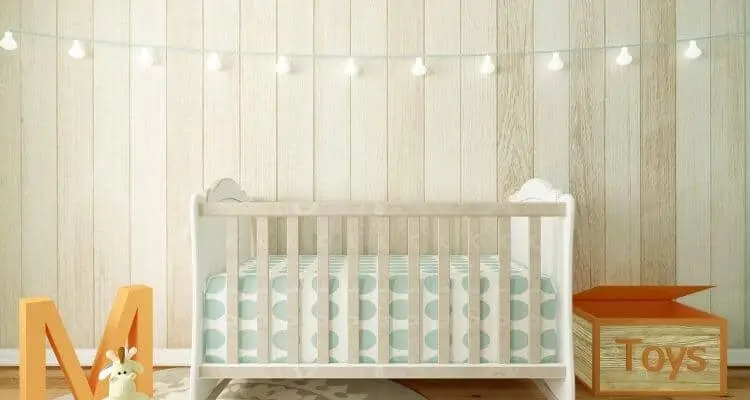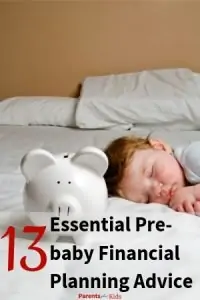13 Essential Pre-Baby Financial Planning Advice

This post may contain affiliate links. If you buy through the link, I may earn a commission. Learn More.
As you prepare for the arrival of your new child you need to make sure to do your pre-baby financial planning.
I know it’s not fun, but it’s very important.
Ask any seasoned parent, and I’m sure they’ll tell you the same thing.
Finances are going to play a significant role before and after your child is born.
Between the ever-changing tax system, retirement looming around the corner, an overpriced healthcare system and college tuition that has no ceiling you need to prepare your family financially for the new addition to your family.
Below is some financial parenting advice to help you on this journey based on what we learned after having our kid.
*Disclosure: This site contains affiliate links. If you click and make a purchase, I may receive a commission. For more info, please see my disclaimer.
1. Know What Your Financial Goals Are
If you don’t already plan for the future than you really need to start today.
If you do have a plan in place, you need to check and see how a new child changes those plans.
Having a new baby is going to throw a big wrinkle in your plans, and it’s best to plan ahead.
For example:
- Are you currently renting? If so, how long do you plan to keep renting?
- Are you planning on buying a home within the next couple of years?
- What about vacations?
- A new baby makes it hard to have certain vacations.
- How is a new child going to affect your retirement?
- Can you save for both college and retirement?
These are some of the questions you need to ask yourself as your planning for your family’s future.
2. Do Not Go Overboard Buying Things You Don’t Need
Having a baby can sometimes cause parents to think they’re Congress and just keep spending.
Congress might get away with unchecked spending but you can’t. When you’re preparing for your baby focus on only buying the new baby essentials.
There’s a lot of things that might be nice to have, but unless you’re a high-income earner (and even then), you’re going to have to make sacrifices.
Start off with the new baby items you need and then start getting the baby items you want as your finances can handle.
Related: When Should I Start Buying Baby Stuff?
3. Make a Budget and Track Your Spending
If you’re not careful, your spending can get out of control quick.
Between diapers, paying for daycare and everything else you think you’ll need or want you can find yourself piling on debt.
My advice is to make a budget for your household and track your spending.
A good budget will show you where your money is going and allow you to further your family’s goals and dreams by letting you cut down on things that don’t matter so you can save for things that do.
The other reason to have a budget is you don’t want to find yourself in a situation where you don’t have the money to buy the things you need because you’ve spent it on things you want.
A budget is not sexy at all. If you’re not used to it, it’ll frustrate you at the beginning.
I encourage you to move past the beginning because it gets better over time and you’ll feel and see the difference it’ll make in your family.
I get into budgeting your household in greater detail in another article, but here’s a condensed version to get you started.
Quick Steps to Budgeting your Household Income
- Calculate what your monthly household income is.
- Figure out who you’re going to be paying bills to (ex. water, gas, grocery, cable, etc.)
- Order your expenses based on the most important bills (ex. food, water, and shelter are going at the top of the list)
- Estimate how much each expense is going to be
- Add up your income
- Add up your expenses
- Subtract your expenses from your income (i.e., income-expenses= disposable income)
- Set your goals based on
➩If your income is higher than your expenses
➩Or if your expenses are greater than your income. - Analyze how well you stayed on the budget at the end of the month
- Repeat the steps
The more you budget, the better you get at it.
4. Pay off Your Debts
There are differing opinions on this. Some believe in good debts others like me don’t really like debt of any kind.
At the very least you need to know how much debt you have and who it’s with.
You’re going to be in a lot of stress once the new baby arrives.
Between doctor’s visits and hospital bills, that’s potentially more debt that’s going to be added to the pile.
If you have debt in default and in collections, make sure you know about it.
The last thing you need is to have bill collectors start harassing you right after you have a new baby.
…Their timing is that bad!
5. Who’s Going to Watch Him/Her? Daycare?
Is your child going to need childcare or is one of you going to be a stay-at-home mom or stay-at-home dad?
Is a relative going to help to watch him/her after they’re born?
Not every family will have to worry about childcare, but most do. Depending on where you live daycare can be pricey.
As a family, you could be spending anywhere between 14% and 26% of your income on daycare (source).
The cost is one of the big cons of daycares so plan accordingly. If you need help here’s a guide on find affordable daycares.
If one of you decide to be a stay-at-home parent you need to take into account the loss of income if the parent was previously working.
Related: The Pros and Cons of Your Child Going to Daycare
6. Set Up Your Emergency Fund
Setting up an emergency fund is one of the cornerstones of financial planning you need to do for your family.
Unfortunately, many American households fall short of that recommendation.
Only 56% of American families could cover a $400 emergency without needing to sell their personal possession or borrow money (source).
Is your family in the same situation?
The typical recommendation is to save 3 to 6 months of expenses in your emergency fund.
While 3-6 months of expenses might be a lot for some families, it’s important to at least get started with saving something. Murphy’s Law has a way of happening.
When you bring home that sweet bundle of joy, that’s a prime time for a car to break down, or the A/C and heater to stop working.
7. Keep Focusing on Retirement
I believe your retirement plan shouldn’t change even with a kid.
It might be delayed a little or stopped temporarily, but you should still be focused on accomplishing your retirement goals.
You should not depend on social security as your only source of funds for retirement.
As we wrote in Should Parents Save for College or Retirement social security only pays out between $1,404 and 16,848 a year.
Kids college is not an excuse to not save for retirement. If push comes to shove always pick your retirement.
8. Update Your Life Insurance
If you and your spouse don’t have life insurance than you really need to get one.
Life insurance is another cornerstone of sound financial planning. It’s a way for you to take care of your loved ones if you pass away.
There are multiple schools of thought on this (more on this in a later post), but one of the recommendations favored by financial gurus like Dave Ramsey is to have 10-12 times your income for life insurance.
The thought process is if you or your spouse passes the life insurance money can be invested, and income from the invested money will closely replicate the deceased person’s income.
If this is going to be your first child or you’re adding more to your family, I cannot stress harder the importance of getting life insurance in place.
Pro-Tip:
Even stay-at-home moms or stay-at-home dads need life insurance also.
9. Update Your Health Insurance
When your child is born, you’re going to need to add them to your health insurance.
Parents have to add their new baby within 30 days of their birth (source).
Make sure to get this done!
This is not something to procrastinate. You’re going to have multiple appointments and plenty of ER visits.
Pro-Tip:
You’re probably going to meet your deductible the year your baby’s born. If there’s been some medical procedures you’ve been putting off, you might consider doing it the same deductible year as your child’s birth.
10. Review Your Estate Planning
Estate planning is an essential part of financial planning and life insurance is a way to take care of your family if you’re not around.
Make sure you have a will in place that’s up to date with instructions.
Some of the questions you need to ask yourself:
- Who’s going take care of my child if me and my spouse pass away?
- Who’s going to control the assets and manage the funds of the life insurance for my kids until they’re able to do it themselves.
This might not seem like a big deal but absent a thorough estate plan with proper directions you could be leaving it up to the courts to decide all of that.
Do some online searches and see how well that’s panned out for parents letting the courts make their estate decisions after they pass away…you’ll see it’s usually a hot mess.
One of the advice for soon to be parents is to save for their child’s college if they have disposable income.
11. Plan on How You’re Going to Save for your Kid’s College

If you have the disposable income, you should consider starting to put money away for your child’s college.
You might say it’s really early. But there are a lot of benefits to saving sooner rather than later.
For example, the earlier you start saving for your child’s college in education accounts such as a 529 plan, the longer runway you’ll let compound interest do the heavy lifting for you.
There are tax benefits to saving your child’s college fund in an account like a 529 Plan such as tax-free growth.
12. Are You Taking Maternity or Paternity Leave
How much time do you plan to take after your baby’s born?
You need to figure out if you’re entitled to maternity or paternity leave and if so is it paid or unpaid.
If it’s paid maternity or paternity leave than you probably don’t have much to worry about.
If it isn’t, you need to figure out what your options are.
13. Understand How the New Baby Will Affect Your Taxes
Taxes are forever changing and having a baby will probably affect your taxes.
With the likes of the child tax credit and the ever-changing nature of taxes, in general, you need to talk to your families accountant to understand how having a new baby will affect your end of year taxes.
Taxes are one of those things you never want to be surprised about. The sooner you know, the sooner you can plan accordingly.
In Conclusion Take Action

Coming from somebody who used to know very little about finance years ago I know how hard it can be to take action.
There were times I wanted to ignore my debts and pretend it didn’t exist because not knowing was easier than facing the truth.
I want to encourage you to be better than I was.
Because planning and seeking advice on financial planning for new parents doesn’t do you any good if you don’t act.
What other pre-pregnancy financial planning advice did we miss?
Please take a second to share this article, so we can educate others.

A necessity
🙂
These are great tips. Having a baby definitely throws your finances for a loop.
Agreed. Having a new baby is a blessing. But it can be difficult.